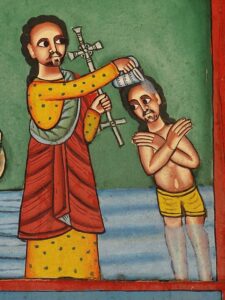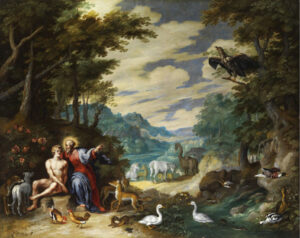 What is Lent all about?
What is Lent all about?
Some say it’s a time when we are supposed to find the presence of God in everyday life. The Most Rev. Dr. Jonn Sentamu, Archbishop of York from 2005 to 2020, suggested as much in his 2015 Ash Wednesday meditation when he said, “Lent is a time to get to know God better.”[1] The metaphor of keeping Lent as being a journey during which we search for, find, and come to know more of God is so widespread and prevalent, one cannot find its origin.
It seems to be the most common way to think about Lent. But that way isn’t working for me this year, especially as I contemplate Mark’s description of Jesus’ baptism and its aftermath. If in our Lenten discipline we are to be, in some way, doing what a Lenten hymn attributed to St. Gregory the Great says — “keep[ing] vigil with our heavenly lord in his temptation and his fast”[2] — then we should pay particular attention to what really was going on there and seek to do during Lent what seems to be going on with Jesus in the wilderness.
 There’s a story about a pastor giving a children’s sermon. He decides to use a story about forest animals as his starting point, so he gathers the kids around him and begins by asking them a question. He says, “I’m going to describe someone to you and I want you to tell me who it is. This person prepares for winter by gathering nuts and hiding them in a safe place, like inside a hollow tree. Who might that be?” The kids all have a puzzled look on their faces and no one answers. So, the preacher continues, “Well, this person is kind of short. He has whiskers and a bushy tail, and he scampers along branches jumping from tree to tree.” More puzzled looks until, finally, Johnnie raises his hand. The preacher breathes a sigh of relief, and calls on Johnnie, who says, “I know the answer is supposed to be Jesus, but that sure sounds an awful lot like a squirrel to me.”
There’s a story about a pastor giving a children’s sermon. He decides to use a story about forest animals as his starting point, so he gathers the kids around him and begins by asking them a question. He says, “I’m going to describe someone to you and I want you to tell me who it is. This person prepares for winter by gathering nuts and hiding them in a safe place, like inside a hollow tree. Who might that be?” The kids all have a puzzled look on their faces and no one answers. So, the preacher continues, “Well, this person is kind of short. He has whiskers and a bushy tail, and he scampers along branches jumping from tree to tree.” More puzzled looks until, finally, Johnnie raises his hand. The preacher breathes a sigh of relief, and calls on Johnnie, who says, “I know the answer is supposed to be Jesus, but that sure sounds an awful lot like a squirrel to me.” “Put things in order, … agree with one another, live in peace.”
“Put things in order, … agree with one another, live in peace.”
 Come Holy Spirit, Comforter, Spirit of Truth,
Come Holy Spirit, Comforter, Spirit of Truth,

